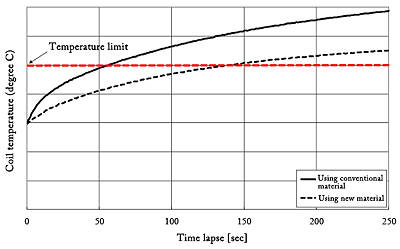- Home » News » Technology News
Novel insulation allows motors to operate twice as long at full power
Japanese researchers have developed a new insulating material for motor coils that allows a motor to operate at maximum power for more than twice as long as conventional insulation. The new material also improves the motor’s efficiency by about 1%.
The researchers, from Nippon Kayaku and the Japan Aerospace Exploration Agency (Jaxa), have developed the material primarily to allow motors that propel electrically-powered aircraft to operate at full power for long periods during take-off, but they say that technology could also have industrial and automotive applications.
In conventional motors, copper losses (caused by electrical resistance) represent a major part of the motor’s total energy losses. The coils are difficult to cool, and as the coil temperature increases, so does its resistance. As a result, the electric current is limited, and the maximum power of the motor is reduced. Sometimes, the coil can burn out.
Controlling the rise of temperature in the coil is therefore a challenge when trying to maximise the power from a motor. Conventionally, this is tackled by limiting the length of time that a motor operates at full power, or by using a larger motor, or by introducing a cooling system.
In the case of motors used to drive electric cars, limiting the maximum power to around 30 seconds is sufficient for practical use. But the motors used to propel electric aircraft need to maintain maximum power for two to five minutes while the plane is taking off. An improved insulation material is therefore needed for this duty.
In its quest for a small, high-performance electric aviation motor, Jaxa had been looking for a coil coating material that is durable, provides good insulation and improves thermal conductivity. At the same time, Kayaku was developing a thermally-conductive, heat-resistant insulating material that could be used at temperatures up to 250°C, while providing high thermal conductivity and good adhesive properties.
In 2011, Kayaku and Jaxa started work on a joint development project in which they applied the insulating material to a coil for aviation motors that Jaxa tested and evaluated.

The new coating material is based on reactive polyamide resin that can withstand temperatures up to 250°C. Applying the coating involves a heat treatment process at 100–150°C.
Tests by Jaxa showed that a motor using the new insulating material can operate at full power for 180 seconds – more than twice as long as the 85 seconds achieved by motors using conventional insulation.
In addition, the motors using the new material achieved a maximum efficiency of 93% compared to 92% for an equivalent conventional motor. And the thermal resistance between the coil and the ambient air for the new design was 70% of the value for a standard motor.
The Japanese researchers says that technology could be used to produce a more powerful motor than a conventional machine of a similar size, or a smaller, lighter motor with a similar power rating.
They expect their technology to be used not only in aviation applications, but also for large vehicles such as buses and trucks, and for industrial applications that need high-power motors.





